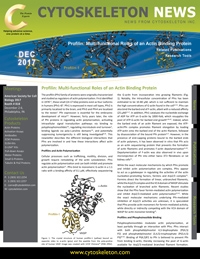December Newsletter: Profilin: Multi-functional Roles of an Actin Binding Protein
- By Cytoskeleton Inc. - Actin News
- Dec 12, 2017

The profilin (Pfn) family of proteins were originally characterized and studied as regulators of actin polymerization. First identified in 1976, these small (14-17 kDa) proteins exist as four isoforms in humans (Pfn1-4). Pfn1 is expressed in most cell types, Pfn2 is primarily localized to the brain, and Pfn3 and Pfn4 are localized to the testes. Pfn expression is essential for the embryonic development of mice. However, forty years later, the role of Pfn proteins in regulating actin polymerization, activating intracellular signal transduction pathways via binding to polyphosphoinositides, regulating microtubule end turnover, binding ligands via poly-L-proline domains, and potentially suppressing tumorigenicity is still being investigated. This newsletter describes the different biological interactions that Pfns are involved in and how these interactions affect actin polymerization.
Profilins and Actin Polymerization
Cellular processes such as trafficking, motility, division, and growth require remodeling of the actin cytoskeleton. Pfns regulate actin polymerization and can both inhibit and promote actin polymerization. Pfns bind to monomeric G-actin in a 1:1 ratio with a binding affinity of 0.1 µM, effectively sequestering the G-actin from incorporation into growing filaments. Notably, the intracellular concentration of Pfns has been estimated to be 10-80 µM, which is not sufficient to maintain the high concentrations of G-actin found in the cell.
Also included in this newsletter:
- Actin Proteins, Actin Biochem Kits, and more.
- Related Publications

